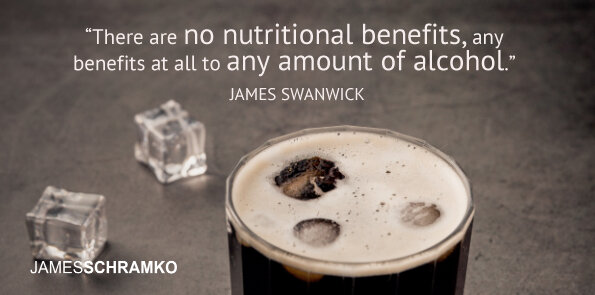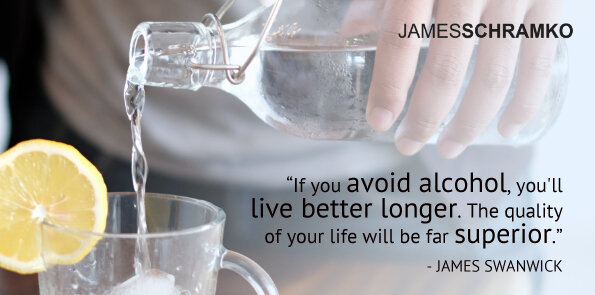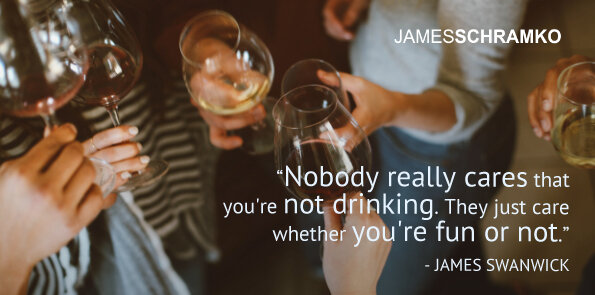Podcast: Download (Duration: 34:11 — 32.1MB)
Get Notified Of Future Episodes Apple Podcasts | Spotify | Amazon Music | Android | Blubrry | Gaana | TuneIn | Deezer | Anghami | RSS | More
There are many good reasons to quit drinking alcohol, and if you’re a business owner, here’s a powerful one – it could cost you millions in revenue.
James has brought on guest James Swanwick of alcoholfreelifestyle.com to expand on this topic.
In their chat, they’ll explore the “harmlessness” of after work drinks.
They’ll see just how real the touted health benefits of alcohol are.
And James Swanwick will suggest strategies for sticking with non alcoholic drinks in a social setting.
Table of contents
1. Are more people interested in not drinking?
2. The reasons people typically drink
3. Childhood roots of dysfunction
4. An attractively packaged poison
5. Once a socially acceptable drinker
6. Young people and alcohol
7. What not drinking does for James
8. 90 days without drink
9. The problems you can fix by kicking drink
10. Strategies for non-drinkers
11. Does any of this interest you?
Are more people interested in not drinking?
From what James can tell as an outsider, The popularity of not drinking is growing. Can James Swanwick confirm this?
It’s true, says our guest, particularly among entrepreneurs who value clarity, focus, and productivity. Alcohol’s reputation is deteriorating, as people realize the negative impact it can have on their business and personal development.
Business struggles can often be attributed to personal flaws, including excessive drinking, which can affect sleep, energy levels, and overall performance. James Swanwick has specialized in working with entrepreneurs to understand why they are drinking and how it may be hindering their success.
The reasons people typically drink
Drinking, says James Swanwick, can often be a negative coping mechanism for stress and anxiety, perpetuating a vicious cycle of negative emotions and reliance on alcohol.
The root causes of stress and anxiety can often be traced back to childhood experiences, and breaking this cycle requires targeting the underlying issues rather than relying on alcohol. Addressing these issues can help individuals break free from the negative loop and improve their overall well-being and productivity.
Childhood roots of dysfunction
The two Jameses discuss the childhood origins of dysfunction that lead to drinking, exploring how early experiences can shape a person’s behavior and mindset in adulthood.
Swanwick suggests that excessive protection and coddling in childhood can lead to a lack of resilience and an inability to cope with challenging situations later in life. He cites a book called The Happiness Hypothesis, which argues that experiencing some level of pain and suffering is necessary for long-term happiness and fulfillment.
James agrees, sharing an example of a billionaire who attributed his success to the hardships he faced as a child. They both agree that childhood experiences can strongly shape a person’s personality and worldview, and that it is possible to rewrite this “software” in order to overcome negative patterns of behavior.
An attractively packaged poison
James Swanwick likes to refer to alcohol as an “attractively packaged poison” due to its seductive marketing, harmful effects and complete lack of nutritional benefits.
Although some studies from the 1980s suggested that a glass of red wine a day could be good for heart health, current studies have debunked this claim. In fact, the World Health Organization and American Cancer Society recommend zero alcohol intake for better health.
A recent study conducted on 35,000 British individuals found that just one standard drink per night for seven days a week was enough to cause brain damage and destroy gray and white cell matter in the brain.
Once a socially acceptable drinker
James’s guest used to be a socially acceptable drinker, having a couple of drinks each night. He realized, however, in his mid-30s, that it was affecting his energy, focus, sleep, and business.
James Swanwick stopped drinking and developed healthier habits such as exercising, meditating, and joining personal development programs. He believes that even one seemingly innocent drink a day can compromise one’s sleep, focus, strategic business decisions, and overall wellbeing.
James Swanwick stresses that there are no nutritional or other benefits to any amount of alcohol, and that stopping drinking can open the door to healthy habits and better overall quality of life.
Young people and alcohol
Despite the strong social indoctrination around drinking, there is a growing demand for non-alcoholic drinks, with many manufacturers realizing this and creating products to meet the demand. Non-alcoholic drinks were once mocked, but they are now gaining popularity.
Back in the day, James recalls, most young males drank as a badge of honor. And he remembers doing some dumb things in his teens under the influence of alcohol.
Swanwick mentions a study from Seattle that found delaying school start times by almost an hour led to a 70% decrease in teen car accidents, which were often caused by poor sleep due to alcohol consumption.
Now, as an adult, he is more interested in the effects of one or two drinks per night.
What not drinking does for James
James’s decision to not drink has had a significant impact on his life. He stopped heavy drinking after his teenage years and focused on competitive sports and fitness instead.
As an adult, he rarely drinks and only has one drink about once every three months. He believes this has contributed to his good health, centeredness, and business success.
He is also more interested in nutrition and health as he gets older and has a young child to be active with.
Not drinking, James feels, gives him a sort of superpower – as others around him become dulled by alcohol, he retains his focus and precision of thought.
James is very sensitive to food and drink, and is aware that just two drinks can give him a hangover and wipe him out for the next day, something he prefers to avoid.
90 days without drink
James knows his guest is big on research.
At time of recording, James Swanwick is conducting a joint scientific study with the University of Washington and the University of Florida on the results of not drinking for 90 days. The study involves 163 people from the US, Australia, UK, and Singapore who are almost a month into the 90-day stop drinking process.
The participants are sent two surveys a week, which ask about their clarity, focus, energy, business, career, weight loss, sleep, and overall experience of life. The researchers hope to show the effects of not drinking on workplace outcomes and personal well-being.
The study results will be published later this year, and James Swanwick plans to promote them in the mainstream media.
Swanwick has been running his 90-day stop drinking program, Project 90, since 2015. He claims to have a 90% success rate of getting his clients to stay alcohol-free for three consecutive months.
His study with the universities compares the results of the participants who stop drinking with a wait group of 60 people who are still drinking. He hopes the results will show the non-drinkers have gained in all areas of the surveys.
James Swanwick believes the study results will change many people’s lives affected by alcohol, making them see the benefits of not drinking. His ultimate goal is to let people know about the benefits of the 90-day stop drinking program, which has helped many of his clients over the years.
The problems you can fix by kicking drink
According to James Swanwick, avoiding alcohol can lead to both better quality of life and potentially more income for business owners and entrepreneurs. Even seemingly innocent drinking habits, such as one or two drinks a night, can cost individuals millions of dollars in lost revenue opportunities due to decreased productivity and focus.
Swanwick offers a scorecard to help individuals calculate how much money they may be leaving on the table as a result of their drinking habits. By avoiding alcohol, individuals may improve their thinking and energy, leading to better decision-making and potentially increased revenue.
Strategies for non-drinkers
One of the challenges of giving up alcohol is the embarrassment or the feeling of being a killjoy when turning down a drink.
James Swanwick suggests confidently and humorously ordering a non-alcoholic drink – I’m going to get blind on this soda water! – or simply explaining that you don’t drink, that it’s a choice you’ve made, and that it feels good.
Swanwick says that people are more concerned with how much fun you are than whether or not you are drinking. It’s important, he says, to present oneself as confident and engaging, and to avoid apologizing for not drinking.
Does any of this interest you?
People mistakenly believe that drinking alcohol is a reward or celebration, when in reality, living a healthy and active lifestyle can be more rewarding. James experiences this every time he goes for a surf – he’s not hung over, he’s feeling energetic, and he’s doing what he wants to do.
James Swanwick is working towards promoting a poison-free lifestyle through his Alcohol-Free Lifestyle website, and James supports his message, encouraging listeners to consider dialing back their alcohol consumption.
James urges listeners to check out James Swanwick’s website for support and resources. He has much admiration for James Swanwick’s social media presence and the positive impact he is making through his work.
Liked the show? Enjoy all the episodes when you subscribe on iTunes













Leave a Reply